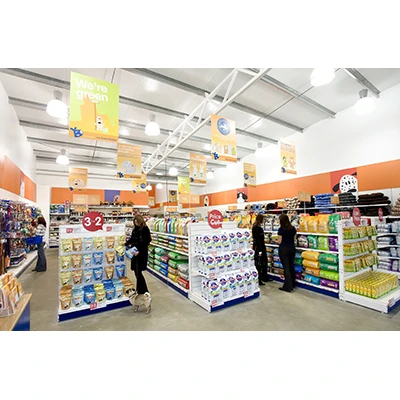
 Well-run garden center businesses in the UK are managing to keep their heads above the current turbulent economic waters as the country slips into a double dip recession. According to the Horticultural Trades Association (HTA), 2011 saw garden center sales increase by 7 percent in comparison to 2010 with many garden centers reporting that last year’s sales not only held up but also outpaced inflation that averaged out at 3.2 percent. However, 2012 to date has been one of the worst on record, with some centers 25 percent down following appalling weather conditions. Nonetheless the industry appears cautiously optimistic over the outlook for 2012. Some commentators are predicting that the industry will grow up to 5 percent a year between now and 2015.
Well-run garden center businesses in the UK are managing to keep their heads above the current turbulent economic waters as the country slips into a double dip recession. According to the Horticultural Trades Association (HTA), 2011 saw garden center sales increase by 7 percent in comparison to 2010 with many garden centers reporting that last year’s sales not only held up but also outpaced inflation that averaged out at 3.2 percent. However, 2012 to date has been one of the worst on record, with some centers 25 percent down following appalling weather conditions. Nonetheless the industry appears cautiously optimistic over the outlook for 2012. Some commentators are predicting that the industry will grow up to 5 percent a year between now and 2015.
These figures demonstrate how the garden center industry is producing more stable sales and profits than retailers located in the UK’s high streets. This has not gone unnoticed by investors, as evidenced by private equity firm Terra Firma paying £276 million for the 128 center-Garden Centre Group earlier this year. One of the reasons Terra Firma is interested in the Garden Center Group is its well-established concession business.
What are concession retailers?
In the UK there are two distinct types of concession retailers. The first occupies space on an unmanned basis, with all goods sold through the garden center tills, with little physical division within the center. The second is a separate area, manned with its own tills. The concession usually occupies a defined space, created either structurally or by strategic placement of shop fittings either inside or outside the garden center. It is this second type of concession that has had the most impact.
|
Watch out for these potential pitfalls
|
The industry wide trend of concessioning started in the 1990s with some garden center operators extending their offerings to areas where they did not have the retailing expertise – for example aquatics, or a café or restaurant. Then, a decade ago, forward-thinking mainstream retailers, including the likes of Laura Ashley, Hobbycraft and Edinburgh Woollen Mill, saw the opportunity to grow their businesses in garden centers and from then on, garden center concessions grew exponentially.
One stop garden center shopping
Over the past five years, garden centers have become the new “out of town” retail centers, offering a wide range of products and entertainment. A destination that all family members, young and old alike, can enjoy. This trend has resulted in increased levels of visitors, significantly extended dwell times and higher levels of spend.
Today’s new generation of garden centers seek to offer a shopping and leisure experience in an attractive setting with a variety of key attractions. Products can range from food, homeware, clothing and camping equipment, through to toys, hot tubs and pet care.
Key benefits from the right mix of concessions can include additional income; improved footfall; reduced overheads; greater diversity for customers; less reliance on seasonal factors; greater efficiencies with traditional “dead space” becoming incoming producing and a raised profile as good quality popular retailers will enhance the reputation of the center.
In essence, a quality concession tenant, occupying a well-chosen area of the garden center on the correct legal basis, can provide a number of benefits and advantages, as long as care is taken not to rush into any agreement without due care and consideration of the potential pitfalls. In the UK today, the real value of these benefits and advantages is being clearly demonstrated in today’s challenging economic environment, providing garden center owners/operators with a degree of recession resilience that is the envy of many high street retailers.
Mike Gilbert is partner and head of garden centers at Gilbert Evans LLP. He can be reached at mgilbert@gilbertevans.com. Gilbert Evans is the UK’s largest garden center specialist property consultancy based in London and Ascot. It offers a full service including buying and selling garden center businesses, site development advice, lease advisory and valuations.

Explore the August 2012 Issue
Check out more from this issue and find your next story to read.
Latest from Garden Center
- America in Bloom announces 2026 program launch and celebrates 25 years of growing vibrant communities
- AmericanHort launches HortCred to advance skills development in the green industry
- Oasis Grower Solutions announces new northeast territory sales manager
- Amanda Solliday named senior manager of Sustainabloom
- New McCarthy-Family Flowers Legacy Fund supports multi-generational retail florists
- Monrovia releases new retail program, Landscape Legends, to mark 100th anniversary
- USDA to conduct 2025 Organic Survey
- Save the date for the 78th Santa Barbara International Orchid Show





